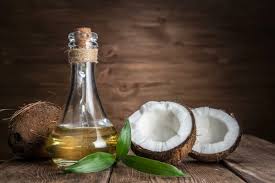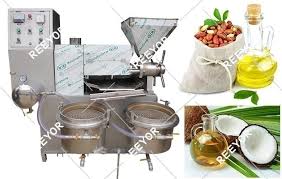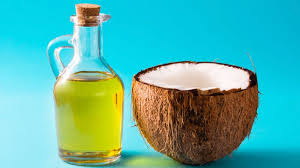![]()
If you’ve landed on this article page, you’re probably searching for a
good business idea—an idea that’s light on the pocket but heavy on
returns, promising both a fulfilling journey and potential profit.
|
How To Start A Lucrative Coconut Oil Production Business In
Nigeria
Coconut oil is a vegetable oil extracted from the kernels or
meat of mature coconuts. The scientific name for coconut is
Cocos nucifera. Coconut oil is a popular ingredient in cooking,
skincare, and hair care products due to its high saturated fat
content and unique nutritional and medicinal properties. It is
commonly produced through traditional methods of pressing or
centrifugation. Coconut oil farming is an important agricultural
activity in many tropical regions, including Nigeria and Africa.
Coconut Oil Production is an important agricultural activity
that is gaining momentum in Nigeria and across Africa. Coconut
is a vital crop in Nigeria, especially in the coastal regions
where the conditions are favorable for coconut cultivation. The
production of coconut oil is essential to the economy and is a
source of income for many people. The coconut oil industry is
rapidly growing in Africa, with countries such as Ghana, Ivory
Coast, and Nigeria being major players.
According to data from the Food and Agricultural Organization
(FAO), Nigeria is the largest producer of coconuts in Africa and
the 18th largest producer in the world. In 2019, Nigeria
produced over 250,000 metric tons of coconuts. However, despite
this high production, the country is yet to tap into the full
potential of the coconut oil industry. The current demand for
coconut oil in Nigeria is met by imports from other countries,
such as the Philippines, Indonesia, and Malaysia.
With the right investment and policies in place, Nigeria has the
potential to become a major exporter of coconut oil to the rest
of the world. The country has an advantage in terms of climate
and soil conditions, which are ideal for coconut cultivation.
Additionally, the rising global demand for organic and natural
products presents an opportunity for Nigeria to position itself
as a leading producer and exporter of high-quality coconut oil.
The production of coconut oil presents a significant economic
opportunity for Nigeria and Africa as a whole. With the right
investment and support, the industry can drive economic growth,
create jobs, and contribute to the development of the region.
Coconut oil production involves the extraction of oil from the
kernel or meat of mature coconuts. The oil is high in saturated
fat and has a wide range of applications, including cooking,
cosmetics, and medicine. Coconut oil production in Nigeria and
Africa is a growing industry due to the abundant availability of
coconuts in the region.
The production process involves several stages, including
shelling, paring, grinding, drying, and pressing. The extracted
oil can be further processed to produce refined or virgin
coconut oil, which can then be packaged for sale.
The increasing demand for coconut oil in the global market
provides an excellent opportunity for countries like Nigeria to
increase their coconut oil production and exports.
How To Produce Coconut Oil In Nigeria or Africa
Here is a step-by-step guide on how to produce, manufacture, and
package coconut oil in Nigeria and Africa:
Source for coconuts: The first step is to source for fresh
mature coconuts from local farmers or markets.
Husking and Shelling: Remove the husk from the coconut by using
a machete or a coconut peeler. Crack the shell with a hammer or
a coconut cracker to extract the coconut flesh.
Grating: Grate the coconut flesh using a mechanical grater or a
manual grater. This process helps to break the coconut flesh
into smaller pieces.
Drying: Dry the grated coconut in the sun or an oven to remove
excess moisture content. Ensure that the moisture content is
reduced to about 10%.
Extraction: Extract the coconut oil from the dried grated
coconut using a mechanical press or expeller. This process helps
to separate the oil from the flesh.
Filtering: Filter the extracted coconut oil using a muslin cloth
or a filter press to remove impurities.
Settling: Allow the filtered coconut oil to settle for about 24
hours to separate any water and sediments from the oil.
Bottling and Packaging: After the oil has settled, carefully
pour the oil into a clean, dry container or bottle, seal it
tightly, and label it appropriately.
Distribution: Distribute the packaged coconut oil to local
markets or supermarkets.
Marketing: Create a marketing plan to promote your coconut oil
brand, such as advertising in local newspapers or online
platforms.
By following these steps, you can produce, manufacture, and
package coconut oil in Nigeria and Africa for sale to consumers.
Coconut oil production is a viable business opportunity in
Nigeria and Africa, considering the abundance of coconut trees
and the growing global demand for coconut products. With the
right approach and investment, entrepreneurs can leverage this
opportunity to create profitable ventures, stimulate economic
growth, and contribute to poverty reduction. However, it is
important to note that coconut oil production is not without its
challenges, which range from high competition to fluctuating
market prices and inadequate infrastructure. Entrepreneurs need
to be aware of these challenges and have solid business plans in
place to mitigate them. Additionally, there are different types
of coconut oil production businesses, each with its unique
approach and equipment requirement.
It is important to choose the right type of business that aligns
with the entrepreneur’s resources, expertise, and target market.
Overall, coconut oil production is a promising sector with vast
untapped potentials, and entrepreneurs willing to take the risk
can reap the benefits while contributing to the growth of the
Nigerian and African economy. Get our Practical guide on Coconut Oil Production in Nigeria. In this information, you will learn the best way to market and profit from Coconut Oil Production , you will learn the exact costs of the resources and equipment you need for your Coconut Oil Production. The body of this work is formed from consulting experienced and relevant people running the Coconut Oil Production , to get first-hand information about the success secrets and marketing strategies deployed to achieve business success
|







